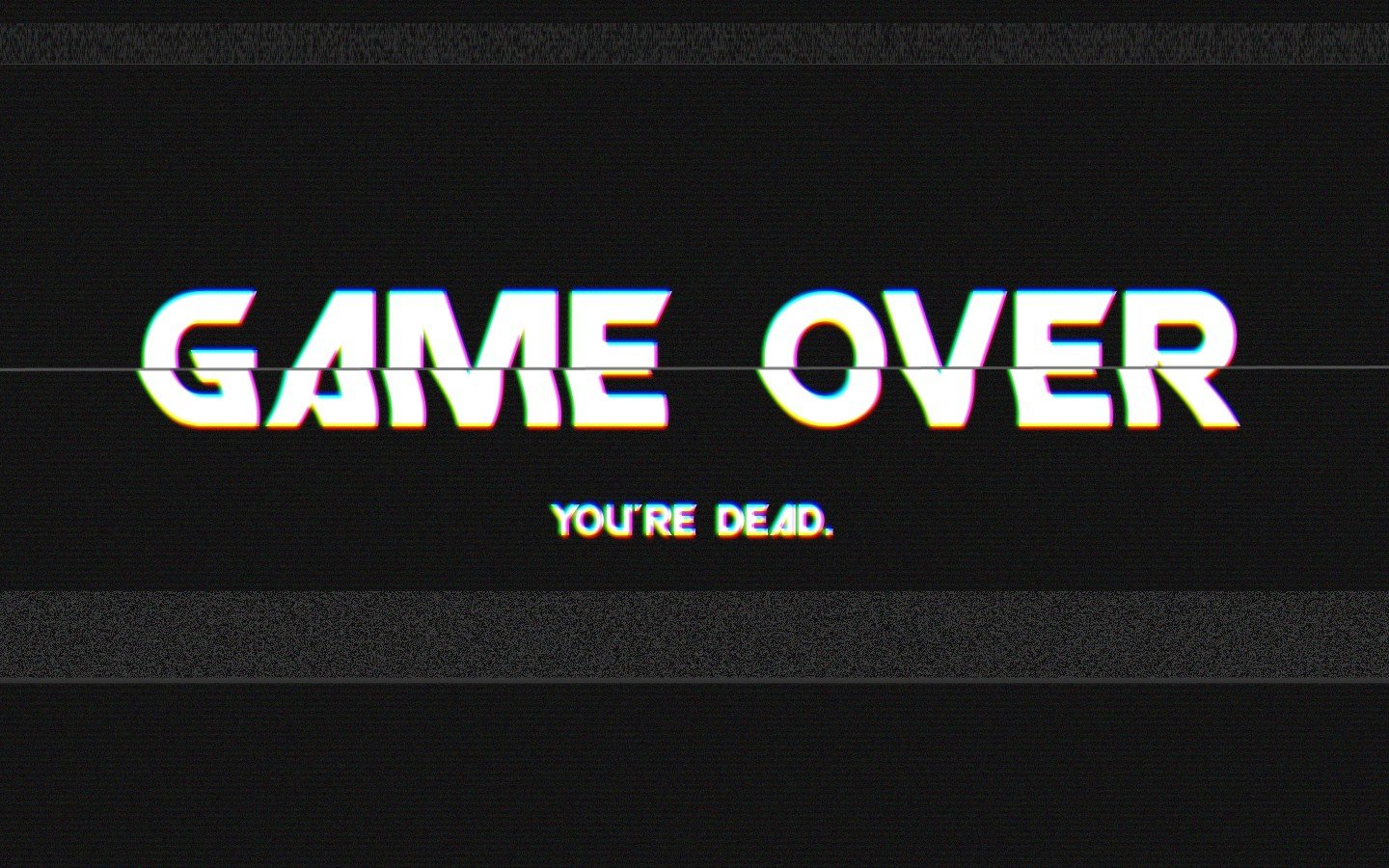Game Over Video Games: The Ultimate Guide To The Phenomenon That's Here To Stay
Ever wondered what the fuss is about when people talk about "game over video games"? It's not just a phrase you hear in retro arcade games anymore. In today's world, this term has taken on a whole new meaning. From the evolution of gaming technology to the cultural impact video games have on society, "game over video games" is more than just a nostalgic throwback. It’s a deep dive into the gaming world that continues to shape the entertainment industry and beyond. So, buckle up and let's explore what makes this phenomenon so captivating.
As we dive deeper into the realm of gaming, you’ll notice that the "game over" screen has evolved significantly over the years. It’s no longer just a sign of defeat. Instead, it’s a symbol of resilience, a call to action for gamers to try again and improve. This mindset is what makes the gaming industry so unique. It’s not just about winning; it’s about the journey, the skills you develop, and the communities you join along the way.
But why should you care? Because video games aren’t just for kids anymore. They’re a multi-billion-dollar industry influencing everything from education to mental health. Understanding "game over video games" means understanding the broader context of gaming culture, its impact on society, and why it’s here to stay.
Read also:Tampa Palms Country Club Your Ultimate Golfing Paradise And Community Hub
Table of Contents
- The History of "Game Over" in Video Games
- Evolution of Video Games
- Psychology Behind "Game Over" Moments
- The Impact of Video Games on Society
- The Gaming Industry Today
- Video Games in Education
- Mental Health and Gaming
- The Future of Video Games
- Gaming Communities and Culture
- Conclusion: Why "Game Over" Isn't the End
The History of "Game Over" in Video Games
Back in the day, "game over" was a harsh reality. You lost all your lives, and that was it. No save points, no checkpoints, just a cold screen telling you it’s over. But this wasn’t just about losing. It was about pushing yourself to do better next time. Games like Pac-Man and Space Invaders set the stage for what would become a global phenomenon.
As technology advanced, so did the concept of "game over." Developers started introducing save systems, continue options, and even tutorials to help players improve. This shift transformed the experience from a frustrating end to a learning opportunity. Today, "game over" is more of a pause button, inviting players to reflect and strategize.
From Arcade Machines to Consoles
Remember the days when you had to pump quarters into arcade machines just to play a few rounds? Those were the glory days of gaming. The "game over" screen was a harsh reminder that your pocket money was running out. But it also created a sense of urgency and excitement. You had to be good—or at least good enough—to keep playing.
- Arcade games were all about high scores.
- Players competed against each other for bragging rights.
- It was a social experience long before online gaming.
Evolution of Video Games
Fast forward to today, and the evolution of video games is nothing short of mind-blowing. We’ve gone from pixelated sprites to hyper-realistic graphics, from simple gameplay mechanics to complex narratives that rival Hollywood blockbusters. But what does this mean for the concept of "game over video games"?
Modern games have redefined the term. Instead of being a finality, "game over" is now a narrative device. In story-driven games, it can signify a character’s death, a plot twist, or even a branching path that leads to different endings. This adds depth and replayability, making the experience more engaging.
The Rise of Open-World Games
Open-world games have taken the gaming world by storm. Titles like "The Witcher 3" and "Red Dead Redemption 2" offer vast, immersive worlds where players can explore, interact, and make choices that affect the outcome. In these games, "game over" is often replaced with "try again" or "learn from your mistakes." It’s about progression, not perfection.
Read also:Ventura County Fairgrounds Your Ultimate Guide To Fun Entertainment And More
- Open-world games encourage exploration and experimentation.
- Players can create their own stories within the game world.
- Failure is just another step towards success.
Psychology Behind "Game Over" Moments
Have you ever wondered why "game over" moments can be so frustrating yet motivating at the same time? It’s all about psychology. When we fail in a game, our brains release dopamine, a chemical associated with pleasure and reward. This makes us want to try again, to see if we can do better next time.
Game developers leverage this psychological response to create engaging experiences. By balancing challenge and reward, they keep players hooked. It’s why you’ll find yourself playing "just one more level" even when you know you should stop.
Why Failure is Good for You
Failure in video games teaches resilience. It’s not about giving up when things get tough; it’s about learning from your mistakes and trying again. This mindset is valuable not just in gaming but in life as well. By embracing failure, we become better versions of ourselves.
- Failure builds perseverance and problem-solving skills.
- It fosters a growth mindset, encouraging continuous improvement.
- Players often form stronger connections with games that challenge them.
The Impact of Video Games on Society
Video games have come a long way from being seen as a waste of time. Today, they’re recognized as a legitimate form of entertainment and even art. The impact of video games on society is profound, influencing everything from pop culture to technology.
Esports, for example, has turned gaming into a professional sport with millions of fans worldwide. Players compete for prize money, sponsorships, and fame, much like traditional athletes. This has legitimized gaming as a career path, inspiring young people to pursue their passions.
Video Games and Pop Culture
From movies based on video games to music inspired by game soundtracks, the influence of gaming on pop culture is undeniable. Characters like Mario, Sonic, and Lara Croft have become cultural icons, recognized by people of all ages. This cross-pollination of media has helped video games reach a wider audience.
- Video games inspire movies, TV shows, and even books.
- They shape trends in fashion, music, and art.
- Gaming culture is now mainstream, embraced by people from all walks of life.
The Gaming Industry Today
The gaming industry is bigger than ever. With revenues exceeding those of the film and music industries combined, it’s clear that video games are here to stay. But what drives this growth? It’s a combination of innovation, accessibility, and community.
Mobile gaming has played a significant role in this expansion. Games like "Candy Crush" and "Clash of Clans" have brought gaming to a global audience, making it accessible to people who might not have considered themselves gamers before. This democratization of gaming has opened up new markets and opportunities.
The Role of Streaming Platforms
Streaming platforms like Twitch and YouTube have revolutionized the way we consume gaming content. Gamers can now watch their favorite players in action, learn new strategies, and even interact with them in real-time. This has created a new form of entertainment that’s both interactive and engaging.
- Streaming platforms have turned gamers into influencers.
- They provide a platform for diverse voices and perspectives.
- Viewers can learn and improve by watching others play.
Video Games in Education
Believe it or not, video games are being used as educational tools. Games like "Minecraft: Education Edition" and "Kerbal Space Program" teach students about science, technology, engineering, and math (STEM) in a fun and interactive way. By gamifying learning, educators are able to capture students’ attention and make education more enjoyable.
Research shows that video games can improve cognitive skills, memory, and problem-solving abilities. They also encourage collaboration and teamwork, skills that are essential in today’s workforce.
Learning Through Play
Learning through play is an effective way to teach complex concepts. Video games provide a safe environment where students can experiment and make mistakes without fear of failure. This hands-on approach to learning has proven to be more effective than traditional methods in many cases.
- Games can simulate real-world scenarios, helping students apply theoretical knowledge.
- They encourage critical thinking and decision-making.
- Interactive learning experiences increase student engagement.
Mental Health and Gaming
While video games have been criticized for contributing to mental health issues, they can also be a force for good. Many games are designed to help players manage stress, anxiety, and depression. Titles like "Headspace" and "SuperBetter" use gamification to promote mental well-being.
Online gaming communities also provide a sense of belonging and support. Players can connect with others who share their interests, forming friendships that transcend geographical boundaries. This social aspect of gaming can be incredibly beneficial for mental health.
Finding Balance
Like anything, moderation is key. While gaming can have positive effects on mental health, excessive play can lead to negative consequences. It’s important to find a balance that works for you and to be mindful of how much time you spend gaming.
- Set limits on playtime to avoid burnout.
- Use gaming as a tool for relaxation, not as an escape from reality.
- Stay connected with friends and family outside of gaming.
The Future of Video Games
What does the future hold for video games? With advancements in technology like virtual reality (VR) and augmented reality (AR), the possibilities are endless. Imagine being fully immersed in a game world, interacting with characters and environments as if they were real. This is the future of gaming, and it’s closer than you think.
Artificial intelligence (AI) is also set to play a major role in the future of gaming. AI-driven characters and scenarios will make games more dynamic and responsive, creating unique experiences for each player. This level of personalization will take gaming to new heights.
The Rise of Cloud Gaming
Cloud gaming is another trend that’s gaining traction. Services like Google Stadia and NVIDIA GeForce Now allow players to stream games without the need for expensive hardware. This makes gaming more accessible and convenient, lowering the barrier to entry for new players.
- Cloud gaming eliminates the need for high-end PCs or consoles.
- It allows players to access their games from anywhere, on any device.
- Streaming services offer a subscription-based model, making gaming more affordable.
Gaming Communities and Culture
Gaming communities are vibrant, diverse, and inclusive. They bring people together from all walks of life, united by a shared love of games. Whether it’s discussing strategies, sharing fan art, or organizing events, these communities foster creativity and collaboration.
Online forums, social media groups, and Discord servers are just a few examples of how gamers connect and interact. These platforms provide a space for players to share their experiences, offer advice, and form friendships. It’s this sense of community that makes gaming so special.
Celebrating Diversity in Gaming
Diversity in gaming is more important than ever. Developers are creating games that reflect the real world, featuring characters from different backgrounds, cultures, and identities. This inclusivity helps players see themselves in the games they play, making the experience more relatable and meaningful.
- Gaming communities are becoming more diverse and inclusive.
- Players are advocating for representation and equality in the industry.
- Games are being used as platforms for social change and awareness.
Conclusion: Why "Game Over" Isn't the End
As we’ve explored, "game over video games" is more than just a phrase. It’s a reflection of the gaming industry’s evolution, its impact on society, and its potential for the future. Whether you’re a casual player or a hardcore gamer, there’s something for everyone in


